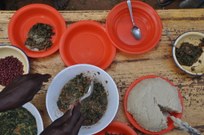Workshop: Gender in Agricultural Value Chains. African Indigenous Vegetables in Kenya
“The gender lens makes science better”
Report about workshop day: Gender in Agricultural Value Chains - The Case of African Indigenous Vegetables in Kenya
As the HORTINLEA project, researching the value chain of African Indigenous Vegetables (AIVs) in Kenya, draws to a close, the final Workshop day of the subprojects (SP) 10 and 7b in cooperation with the Center for transdisciplinary gender studies (ZtG) on Nov 24th gathered fellow researchers, PhD students, commentators and students in lively discussion. The PhD students of SP 10 “Gender Order: Embedding gender in horticultural value chains” and SP 7b “Meal Cultures in Market Trends and Consumption Habits”, both critically assessing gender relations along the value chain, presented their research. They critically examined the bitter and sweet sides of increasing commercialization of AIVs for women along the value chain, from the production to the consumption side.
After welcome remarks by Prof. Dr. Christine Bauhardt, leader of the department of Gender and Globalization, Suse Brettin introduced the HORTINLEA project. With the goal of raising awareness about the advantages of AIVs and promoting their commercialization, the research in HORTINLEA focuses on the value chain of AIVs. Concretely, the ecological, socio-economic and institutional context, in which AIVs are produced, sold and consumed are examined. The subprojects in the department for gender and globalization assess this development from a critical perspective: How does the commercialization of AIVs impact livelihoods of producers and consumers? Who really gains and who loses by upgrading of AIV value chains and how is that interrelated with power, social inequalities and gender relations?
The first part of the workshop addressed the production and selling of AIVs. After the commentating researcher, Dr. Rhiannon Pyburn of the Royal Tropical Institute - KIT, Netherlands introduced the field of ‘Gender Dynamics in Agricultural Value Chains’ with an overview of the existing research and approaches, Ruth Githiga, PhD student of the project, explained the emergence of AIV value chains and their commercialization in Kenya. While AIVs were formerly perceived as a "women’s crop", with the commercialization, men have entered the value chain and are profiting. Also, women’s groups which started as welfare groups, are now actors in the value chain as they farm together. Some women are now able to make a living out of AIV production and enhance their ability to meet practical needs, also resulting in higher independency from husbands. On the other hand, women have to bear with the double burden of household work and AIV production, they experience market harassment and men abandoning their responsibilities in the household as women engage in more working areas. To really assess women’s impact, however, factors as social reproductive work and care work have to be recognized as part of the value chain.
Emma Oketch went on to frame gender dynamics and hierarchies in AIV production as part of structural conflict in Kenya. She identified key factors of this structural conflict as land access and land rights that are inherited patrilineal, access to water, the ability to get loans as well as norms and customs, which are hindering women from taking on positions with decision taking power as well as the traditional division of labor and leadership in households and farming groups. Overall, structural conflict negatively affects food security. In order to counteract, however, structures will need to be changed as well as policies.
In the afternoon, the researcher's presentations turned to the consumption side: The second commentating researcher, Prof. Dr. Anke Niehof from Wageningen University & Research, Netherlands, introduced the audience to her research about "Women as gatekeepers to family nutrition" with a focus on paradoxes and power potentials in women's positions. Subsequently, Meike Brückner and Anne Aswani presented their research results regarding meal cultures of AIVs in Kenya. Meike Brückner introduced newly developed methods during the project: cook-along interviews to experience the preparation process and food mobility mapping to really assess which resources and work load are to be estimated for a meal. She presented on the one hand that AIVs have a high cultural and nutritional value for the interviewed women. On the other hand, however, there is a division of labor in which women shoulder a higher share of the meal preparation and care work, they experience problems with mobility to get all the resources they need, as well as water and time scarcity. To be food secure, so the conclusion, people first need to be meal sovereign.
Anne Aswani continued in outlining the role that AIVs could play in overcoming the double burden of malnutrition in Kenya. Mostly women and children are affected by either over or undernutrition. In the concerning research, meal preparation is oftentimes a missing link. The knowledge of preparation and cooking is limited, mostly indigenous and traditionally passed from mothers to daughters. Women thus shoulder the double burden of formal employment and meal preparation while other people have no access to recipes for AIV preparation. The knowledge thus needs to be transferable, there needs to be a reduction of the workload in preparing AIVs for women and men need to join the process of preparation AIVs.
Gender proved to be an important distinction mark in AIV production and consumption as social and cultural norms determine the division of labor as well as the emancipatory potential of commercialization of AIVs. In the end, as Rhiannon Pyburn said: “The gender lens makes science better.”
For more information on the workshop and the titles of the presentations see the flyer.

 PhD Workshop
PhD Workshop